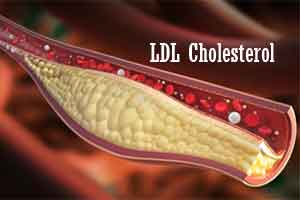- Home
- Editorial
- News
- Practice Guidelines
- Anesthesiology Guidelines
- Cancer Guidelines
- Cardiac Sciences Guidelines
- Critical Care Guidelines
- Dentistry Guidelines
- Dermatology Guidelines
- Diabetes and Endo Guidelines
- Diagnostics Guidelines
- ENT Guidelines
- Featured Practice Guidelines
- Gastroenterology Guidelines
- Geriatrics Guidelines
- Medicine Guidelines
- Nephrology Guidelines
- Neurosciences Guidelines
- Obs and Gynae Guidelines
- Ophthalmology Guidelines
- Orthopaedics Guidelines
- Paediatrics Guidelines
- Psychiatry Guidelines
- Pulmonology Guidelines
- Radiology Guidelines
- Surgery Guidelines
- Urology Guidelines
An avocado a day keeps bad cholesterol under control, finds study

Avocados are a nutrient-dense source of MUFAs and are rich in antioxidants.
Researchers at Penn State have found that eating one avocado a day may help keep "bad cholesterol" at bay.According to them, bad cholesterol refers to both oxidized low-density lipoprotein (LDL) and small, dense LDL particles.The results of the study have been published in the Journal of Nutrition.
Specifically, the study found that avocados helped reduce LDL particles that had been oxidized. Similar to the way oxygen can damage food -- like a cut apple turning brown -- the researchers said oxidation is also bad for the human body.
In a randomized, controlled feeding study, the researchers found that eating one avocado a day was associated with lower levels of LDL (specifically small, dense LDL particles) and oxidized LDL in overweight or obese adults.
"We were able to show that when people incorporated one avocado a day into their diet, they had fewer small, dense LDL particles than before the diet," said Penny Kris-Etherton, distinguished professor of nutrition, who added that small, dense LDL particles are particularly harmful for promoting plaque buildup in the arteries. "Consequently, people should consider adding avocados to their diet in a healthy way, like on whole-wheat toast or as a veggie dip."
"A lot of research points to oxidation being the basis for conditions like cancer and heart disease," Kris-Etherton said. "We know that when LDL particles become oxidized, that starts a chain reaction that can promote atherosclerosis, which is the build-up of plaque in the artery wall. Oxidation is not good, so if you can help protect the body through the foods that you eat, that could be very beneficial."
While previous research demonstrated that avocados could help lower LDL cholesterol, Kris-Etherton and her colleagues were curious about whether avocados could also help lower oxidized LDL particles.
The researchers recruited 45 adult participants with overweight or obesity for the study. All participants followed a two-week "run-in" diet at the beginning of the study. This diet mimicked an average American diet and allowed all participants to begin the study on similar nutritional "footing."
Next, each participant completed five weeks of three different treatment diets in a randomized order. Diets included a low-fat diet, a moderate-fat diet, and a moderate-fat diet that included one avocado a day. The moderate-fat diet without avocados were supplemented with extra healthy fats to match the amount of monounsaturated fatty acids that would be obtained from the avocados.
After five weeks on the avocado diet, participants had significantly lower levels of oxidized LDL cholesterol than before the study began or after completing the low- and moderate-fat diets. Participants also had higher levels of lutein, an antioxidant, after the avocado diet.
Kris-Etherton said there was specifically a reduction in small, dense LDL cholesterol particles that had become oxidized.
"When you think about bad cholesterol, it comes packaged in LDL particles, which vary in size," Kris-Etherton said. "All LDL is bad, but small, dense LDL is particularly bad. A key finding was that people on the avocado diet had fewer oxidized LDL particles. They also had more lutein, which may be the bioactive that's protecting the LDL from being oxidized."
The researchers added that because the moderate-fat diet without avocados included the same monounsaturated fatty acids found in avocados, it is likely that the fruit has additional bioactives that contributed to the benefits of the avocado diet.
Kris-Etherton said that while the results of the study are promising, there is still more research to be done.
"Nutrition research on avocados is a relatively new area of study, so I think we're at the tip of the iceberg for learning about their health benefits," Kris-Etherton said. "Avocados are really high in healthy fats, carotenoids -- which are important for eye health -- and other nutrients. They are such a nutrient-dense package, and I think we're just beginning to learn about how they can improve health."
For further reference log on to:
http://dx.doi.org/10.1093/jn/
Avocadocholesterol levelscholesterol rangegood cholesterolHDLHDL cholesterolHigh cholesterolhigh-cholesterol dietholesterolhow to lower cholesterolhow to reduce cholesterolJournal of NutritionLDLLDL cholesterollow-density lipoproteinlow-density lipoprotein cholesterolnormal cholesterol levels
Source : Journal of NutritionNext Story
NO DATA FOUND

Disclaimer: This site is primarily intended for healthcare professionals. Any content/information on this website does not replace the advice of medical and/or health professionals and should not be construed as medical/diagnostic advice/endorsement or prescription. Use of this site is subject to our terms of use, privacy policy, advertisement policy. © 2020 Minerva Medical Treatment Pvt Ltd